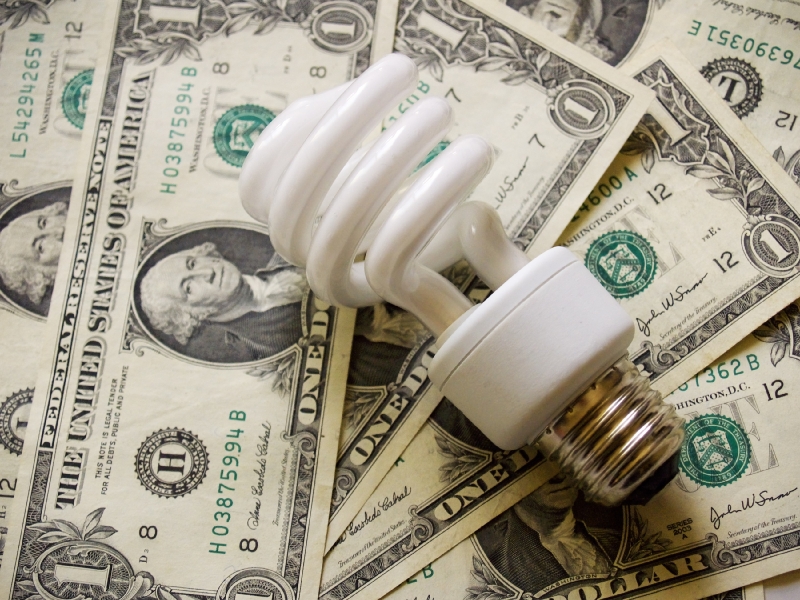 If you think efficiency doesn’t save money, you haven’t been looking at the data.Cross-posted from the Natural Resources Defense Council.
If you think efficiency doesn’t save money, you haven’t been looking at the data.Cross-posted from the Natural Resources Defense Council.
This piece was coauthored by Ralph Cavanagh, senior attorney and co-director of NRDC’s energy program.
Throughout almost four decades of societal progress in getting more work out of less energy, those who deny the promise of energy efficiency have persisted in a bizarre claim: Any energy savings from efficiency are offset by activities that demand additional energy consumption.
While implausible concerns about “rebound effect” have been around since the mid-19th century, they have not impeded recent progress in improving the efficiency of energy use and reducing its environmental impacts.
The most obvious rebuttal to “rebound effect” claims is the performance of the U.S. economy since the early 1970’s: Between 1973 and 2009, U.S. economic production more than tripled even as total U.S. energy use increased by less than a third. If “rebound effect” advocates were right, that record would have been flatly impossible, since savings in energy use would be offset by activities that demand energy, keeping energy use trends in lockstep with economic growth (just as they were for the first three decades after World War II).
That was indeed the confident prediction of some economists when we began our careers in the mid-1970s, and such forecasts lie today on the ash heap of history — along with hundreds of unmourned power plants that never had to be built and mines that never had to be dug.
Yet the same discredited thesis has resurfaced recently in reports by the New Yorker writer David Owen and the iconoclastic Breakthrough Institute, which today released a report subtitled, “A Review of the Literature” (translation: “don’t expect anything new”). In the report, the Institute acknowledges that “truly cost-effective energy efficiency measures should be vigorously pursued as they will lead to an improvement in the general welfare.” Since we agree entirely with that conclusion, it is tempting to end the discussion there, but the authors of the study also insist that the “rebound effect” will deny the global environment any benefits following that “improvement in the general welfare,” so an additional word is in order.
We reject the Institute’s implication that there is some kind of emerging academic consensus around the “rebound effect.” To the contrary, the most respected academic energy efficiency think tanks such as the UC Davis Center on Energy Efficiency and Stanford’s Precourt Institute on Energy Efficiency share the view that energy efficiency delivers big economic and environmental benefits. The reality is that energy efficiency is a huge success story and a key tool to reducing global warming, increasing electric reliability, slashing energy bills for those consumers who can least afford them, and avoids the need to build new costly power plants.
The Breakthrough Institute blames a host of evils on efficiency, but fails to back up their accusations with facts. It acknowledges that serious energy analysis of rebound effects shows them to be “comparatively trivial.” People who insulate their houses don’t absorb all the savings by sweltering through the winter, and buyers of efficient refrigerators don’t start leaving the doors open gratuitously. But after admitting that studies show rebound effects to be small and getting smaller over time, it tries to create a counter-narrative by inserting warnings that “the available evidence to date remains too limited to draw precise conclusions.”
Efficiency does not mean restraining energy services growth. It means using less for the same amount of service. The skeptics are confusing this trend with the sometimes-on, sometimes-off trend towards more efficiency, and claiming that more efficiency induces more demand for energy services.
The problem is that neither Owen nor the Breakthrough Institute has presented any evidence that this is happening in the real world: All of their examples are devoid of any mention of how efficiency leads to demand for activities that demand more energy, as opposed to other economic factors. Instead, they rely on naïve interpretations of economic theory — the same interpretations that show that cost effective energy efficiency is impossible.
Given the weaknesses of this form of economic theory for the purposes of efficiency analysis, it is even more important than usual to rely on data. The clearest data-focused test of the “rebound” hypothesis is whether an economy that embarks seriously on efficiency policy really can cut its overall energy use. Because without question, if the thesis has any plausibility at all, the answer has to be “no”; or at least “not nearly as much as predicted.”
Fortunately for the cause of economic truth, we have such experiments. California, for one, embarked on a broad set of policy reforms to encourage efficiency and promote renewable energy in 1974.
The influence of energy efficiency policies are helping the whole California economy (California would be the eighth largest national economy in the world if it were a nation) to save much more than one would expect. California is not the only example of a state or country promoting efficiency through policy and then showing divergent usage trends from its neighbors and thus demonstrating that energy really is saved. Perhaps this is why serious studies have found that the economy-wide rebound effect is trivially small.
In my blog, I show how California’s projected savings from energy efficiency programs, derived year by year in real time by the California Energy Commission, have resulted in 15 percent reductions; and these programs have resulted in 40 percent reductions compared to the rest of the country.
California is just one example. Other states and several countries that have pursued efficiency policies also demonstrate lower energy usage and growth than those that did not so implement such policies.
Energy efficiency saves energy, increases electric reliability, avoids the need to build new power plants, and saves Americans money. It’s really that simple.



